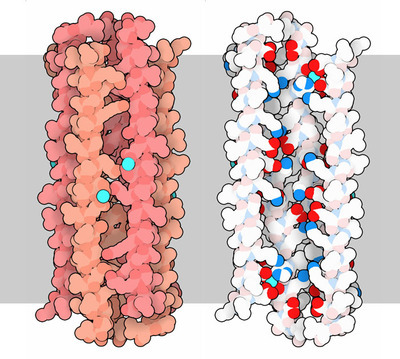News
Facing Rising Temperatures?
07/02 
Bacteria are a constant threat, so our bodies have many defenses to protect us from infection. One of our first lines of defense is a collection of small peptides, termed antimicrobial peptides, that are secreted from our cells. These peptides are toxic to a broad spectrum of bacteria, binding to their membranes and disrupting their function. For instance, dermcidin is an antimicrobial peptide secreted by sweat glands that attacks any bacteria on our skin. The active form of the peptide is 47 amino acids long. As seen in the crystal structure (PDB structure 2ymk), it folds into a long alpha helix, and then six copies of the peptide assemble to form a pore that penetrates the bacterial membrane. This allows ions to flood across the cell membrane, ultimately killing the cell.













